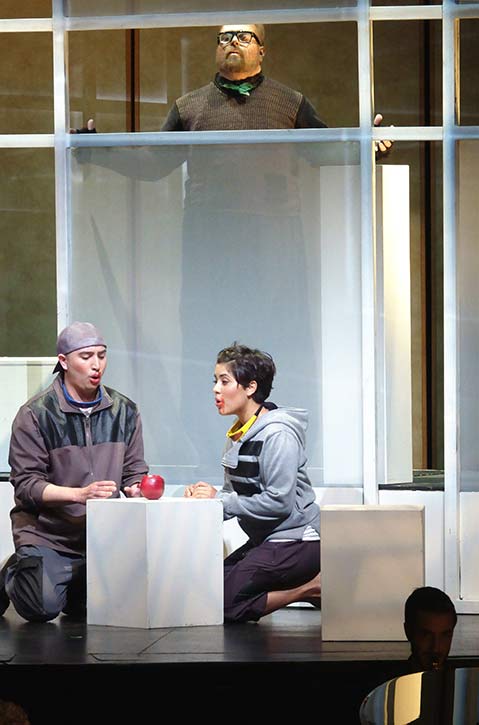Matthew Aucoin’s ‘Second Nature’
New Opera Revises the Legend of the Fall

as bonobo Ben Lowe looks on in Matthew Aucoin’s opera <em>Second Nature</em>.
It’s exciting when the season’s more adventurous programs also turn out to be among the most satisfying. There’s still a long way to go in the Music Academy of the West’s ambitious summer schedule of concerts, but when it is all over, those who were lucky enough to attend this edition of the Festival Artists Series are likely to look back on it with particular admiration and wonder. Pairing the gorgeous, idiosyncratic, and relatively little-known Two Rhapsodies for Oboe, Viola, and Piano of Charles Martin Loeffler with the West Coast premiere of Matthew Aucoin’s chamber opera Second Nature may have done little to reassure those expecting more familiar works by better known composers, but the combination was a splendid success.
Loeffler’s Rhapsodies are based on a pair of lyrics by the French symbolist poet Maurice Rollinat. As recited by pianist Warren Jones in a firm declarative voice, they make a distinctly fin de siècle impression of decadence and moral inversion. For example, “The Pond,” the poem on which the first of the two pieces is based, is a meditation on the ecosystem of a body of water dominated by “ancient blinded fish” and “dying frogs.” Jones, Cynthia Koledo DeAlmeida (oboe), and Cynthia Phelps (viola) brought a sinuous grace and power to the many quicksilver changes of mood in this dazzling display of compositional prowess. The second rhapsody, based on Rollinat’s poem “The Bagpipe,” portrayed a pitched battle between the composition’s two themes, one a beautiful and fully developed theme, and the other an insistently demonic voice meant to represent the unstoppable spirit of a dead bagpiper. Despite, or perhaps as a result of, the dark and mysterious atmosphere that pervaded them, both pieces delivered a profound sense of music as spiritual journey.
After intermission, the audience returned to find a high-tech set of multiple screens onstage, designer François-Pierre Couture’s contribution to the fully staged version of Aucoin’s Second Nature. The 26-year-old composer/conductor/poet is in the midst of a remarkable ascendancy in the classical music world, and this short opera, which was commissioned by the Lyric Opera of Chicago for a performance at that city’s zoo, is likely to remain one of the most discussed works in his oeuvre. Six characters, including one bonobo chimpanzee, inhabit a Bio-Dome-like structure at the dawn of the 22nd century somewhere in the American Midwest. Jake (Allan Chan) and Lydia (Alexandra Smither) are teens who have never been outside the climate-controlled environment in which they now feel trapped. Elder Constance (Noragh Devlin) claims complete control over whatever happens inside and threatens the others with dire punishments for questioning her judgment on any subject. David (Ian Walker) and Elizabeth (Brittany Nickell) are the respective parents of the two young people and get caught in the middle when Jake and Lydia hatch a plan to escape.
As the bonobo who urges them on to freedom with the offer of an apple, Ben Lowe brings a thrilling element of otherness to the proceedings. Writing in a post-Romantic musical idiom that’s influenced by Richard Strauss, among others, Aucoin uses rhyming couplets to put the opera’s subversive message across. In a neat Gnostic reversal of the Garden of Eden story, a bite of this apple tastes like freedom.



